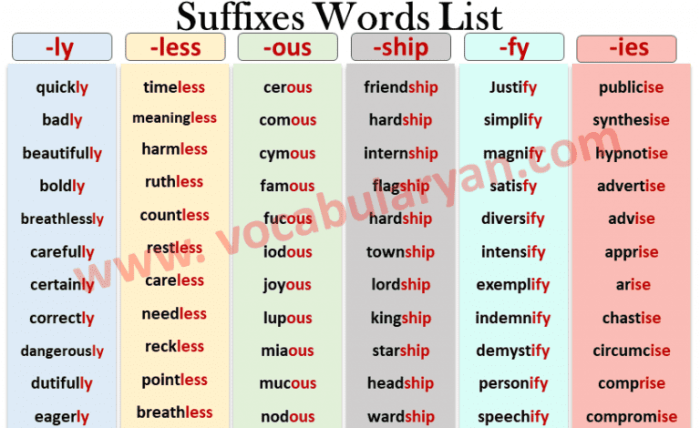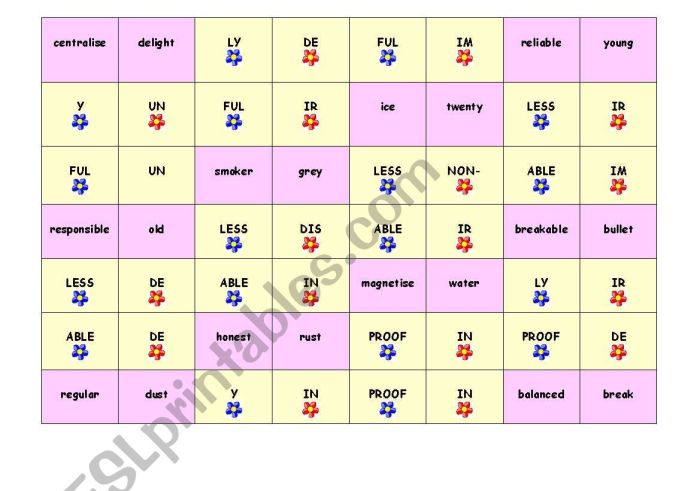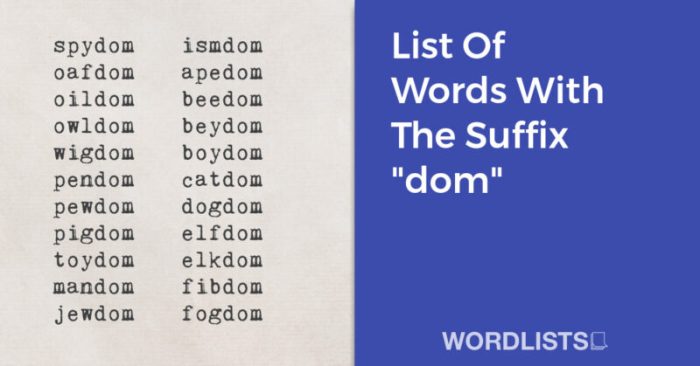Words that have the suffix dom, such as kingdom, freedom, and wisdom, possess a captivating charm that invites linguistic exploration. They evoke a sense of dominion, territory, and abstract concepts, beckoning us to delve into their etymological origins and semantic nuances.
Unveiling the etymology of the suffix “-dom” unveils a rich tapestry of linguistic evolution. Rooted in Old English and Proto-Germanic, it has undergone a remarkable journey, shaping the semantic landscape of countless words.
Suffix Definition

The suffix “-dom” in English denotes a realm, domain, or sphere of influence, power, or activity.
Words ending with “-dom” typically refer to a specific area or territory, a state or condition, or a group of people.
Examples of Words Ending with “-dom”
- Kingdom
- Freedom
- Wisdom
- Christendom
- Fandom
Etymology and Origins
The suffix “-dom” traces its roots to the Proto-Indo-European (PIE) root -dem-, meaning “house” or “dwelling.” This root is also found in Latin, where it evolved into the suffix “-domus.” From Latin, “-dom” entered English through Old French and Middle English.
Linguistic Evolution
Over time, the meaning of “-dom” expanded beyond its literal sense of “house” to encompass abstract concepts related to power, authority, and territory. This semantic shift can be seen in words like “kingdom,” “dukedom,” and “freedom,” which all denote domains or spheres of influence.
Semantic Analysis

Words ending in “-dom” exhibit a diverse semantic range, encompassing concepts related to domains, spheres of influence, and abstract qualities.
These words often refer to:
Domains and Territories
- Kingdom, dukedom, earldom: Territories ruled by a monarch or noble.
- Bishopric, archbishopric: Ecclesiastical jurisdictions under the authority of a bishop or archbishop.
- Christendom, Islamdom: Religious communities or spheres of influence.
Spheres of Influence and Expertise
- Freedom, serfdom: States of personal liberty or servitude.
- Wisdom, martyrdom: Qualities or experiences associated with knowledge or sacrifice.
- Fandom, stardom: Communities or statuses related to admiration or celebrity.
Abstract Qualities and Concepts, Words that have the suffix dom
- Random, boredom: States of unpredictability or tedium.
- Wisdom, martyrdom: Qualities or experiences associated with knowledge or sacrifice.
- Freedom, serfdom: States of personal liberty or servitude.
Word Formation: Words That Have The Suffix Dom

The suffix “-dom” is used to form nouns from adjectives, verbs, and other nouns. When added to an adjective, “-dom” creates a noun that refers to the state or quality of being described by the adjective. For example, the adjective “free” can be transformed into the noun “freedom,” which refers to the state of being free.
When added to a verb, “-dom” creates a noun that refers to the action or process described by the verb. For example, the verb “govern” can be transformed into the noun “government,” which refers to the action or process of governing.
When added to another noun, “-dom” creates a noun that refers to the domain or realm of the first noun. For example, the noun “kingdom” refers to the domain or realm of a king.
Rules for Deriving New Words from Existing Ones
- To derive a noun from an adjective using “-dom,” simply add “-dom” to the end of the adjective. For example, “free” becomes “freedom.”
- To derive a noun from a verb using “-dom,” add “-dom” to the end of the verb’s present participle form. For example, “govern” becomes “governing,” and then “governing” becomes “government.”
- To derive a noun from another noun using “-dom,” simply add “-dom” to the end of the noun. For example, “kingdom” becomes “kingdomdom.”
Categorization

Words ending with “-dom” can be categorized into different semantic domains based on their meanings. These domains include abstract nouns, territories, fields of study, and more.
The following table provides a categorization of some common words ending with “-dom”:
Abstract Nouns
- Freedom
- Kingdom
- Wisdom
Territories
- Christendom
- Dukedom
- Earldom
Fields of Study
- Botany
- Chemistry
- Geology
Other
- Stadium
- Colosseum
- Auditorium
Historical Usage

Words ending in “-dom” have a rich history in English literature, appearing in various contexts and evolving in their usage over time. These words often convey concepts related to domains, states, or conditions, and their historical usage provides insights into the development of the English language.
Old English Origins
The suffix “-dom” entered the English language from Old English, where it was derived from the Proto-Germanic suffix “-dōmaz.” This suffix formed nouns denoting abstract concepts, states, or conditions, such as “kingdom” (cynedom) and “freedom” (freodom).
Middle English Expansion
In Middle English, the use of “-dom” expanded, with new words emerging to describe various domains and conditions. Examples include “dukedom” (dukedom), “earldom” (erldom), and “serfdom” (serfdom).
Early Modern English Refinement
During the Early Modern English period, the suffix “-dom” continued to be used to form nouns, but its usage became more refined. Words like “kingdom” and “freedom” took on their modern meanings, while new words such as “boredom” and “wisdom” entered the lexicon.
Let’s shift gears for a bit and dive into the fascinating world of rational exponents. If you’re feeling a bit rusty on the subject, check out this helpful quiz: rational exponents quiz part 2 . Afterward, let’s return to our discussion of words that end with the suffix “dom” and explore their intriguing linguistic patterns.
Modern English Usage
In Modern English, “-dom” remains a productive suffix, forming nouns that describe domains, states, or conditions. However, its usage has become more specialized, with many words taking on specific meanings in particular fields or contexts.
Cross-Linguistic Comparisons

The suffix “-dom” finds parallels in various languages across the globe. In German, the suffix “-tum” performs a similar function, as seen in words like “Königreich” (kingdom) and “Herzogtum” (dukedom). Similarly, in Dutch, the suffix “-dom” appears in terms like “koninkrijk” (kingdom) and “hertogdom” (dukedom).
Slavic Languages
Slavic languages employ the suffix “-stvo” to convey a domain or realm. Examples include “kraljevstvo” (kingdom) in Serbian and “królestwo” (kingdom) in Polish.
Romance Languages
In Romance languages, the suffix “-ado” or “-azgo” serves a similar purpose. Spanish employs “-ado” in words like “reino” (kingdom) and “-azgo” in “ducado” (dukedom). Italian utilizes “-ato” in terms like “regno” (kingdom) and “-ato” in “ducato” (dukedom).
Unique Characteristics
While sharing some similarities, the suffix “-dom” exhibits unique characteristics across languages. In English, it often denotes a state, condition, or realm, as in “freedom” or “kingdom.” In German, “-tum” can also convey an abstract concept, as in “Eigentum” (property) or “Reichtum” (wealth).
Question Bank
What is the meaning of the suffix “-dom”?
The suffix “-dom” typically denotes a state, condition, territory, or realm, often conveying a sense of dominion or domain.
How is the suffix “-dom” used in word formation?
The suffix “-dom” is added to nouns, adjectives, and verbs to create new nouns that express a state, quality, or domain related to the base word.
Can you provide some examples of words that have the suffix “-dom”?
Examples of words that have the suffix “-dom” include kingdom, freedom, wisdom, Christendom, and boredom.